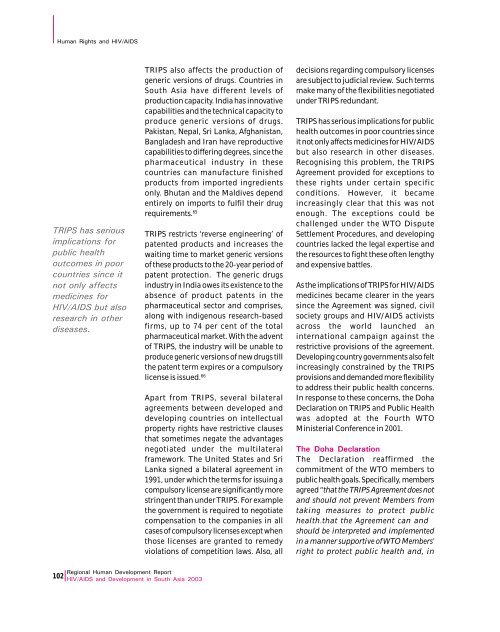Download Report - UNDP Asia-Pacific Regional Centre - United ...
Download Report - UNDP Asia-Pacific Regional Centre - United ...
Download Report - UNDP Asia-Pacific Regional Centre - United ...
Create successful ePaper yourself
Turn your PDF publications into a flip-book with our unique Google optimized e-Paper software.
Human Rights and HIV/AIDSTRIPS has seriousimplications forpublic healthoutcomes in poorcountries since itnot only affectsmedicines forHIV/AIDS but alsoresearch in otherdiseases.TRIPS also affects the production ofgeneric versions of drugs. Countries inSouth <strong>Asia</strong> have different levels ofproduction capacity. India has innovativecapabilities and the technical capacity toproduce generic versions of drugs.Pakistan, Nepal, Sri Lanka, Afghanistan,Bangladesh and Iran have reproductivecapabilities to differing degrees, since thepharmaceutical industry in thesecountries can manufacture finishedproducts from imported ingredientsonly. Bhutan and the Maldives dependentirely on imports to fulfil their drugrequirements. 65TRIPS restricts ‘reverse engineering’ ofpatented products and increases thewaiting time to market generic versionsof these products to the 20-year period ofpatent protection. The generic drugsindustry in India owes its existence to theabsence of product patents in thepharmaceutical sector and comprises,along with indigenous research-basedfirms, up to 74 per cent of the totalpharmaceutical market. With the adventof TRIPS, the industry will be unable toproduce generic versions of new drugs tillthe patent term expires or a compulsorylicense is issued. 66Apart from TRIPS, several bilateralagreements between developed anddeveloping countries on intellectualproperty rights have restrictive clausesthat sometimes negate the advantagesnegotiated under the multilateralframework. The <strong>United</strong> States and SriLanka signed a bilateral agreement in1991, under which the terms for issuing acompulsory license are significantly morestringent than under TRIPS. For examplethe government is required to negotiatecompensation to the companies in allcases of compulsory licenses except whenthose licenses are granted to remedyviolations of competition laws. Also, alldecisions regarding compulsory licensesare subject to judicial review. Such termsmake many of the flexibilities negotiatedunder TRIPS redundant.TRIPS has serious implications for publichealth outcomes in poor countries sinceit not only affects medicines for HIV/AIDSbut also research in other diseases.Recognising this problem, the TRIPSAgreement provided for exceptions tothese rights under certain specificconditions. However, it becameincreasingly clear that this was notenough. The exceptions could bechallenged under the WTO DisputeSettlement Procedures, and developingcountries lacked the legal expertise andthe resources to fight these often lengthyand expensive battles.As the implications of TRIPS for HIV/AIDSmedicines became clearer in the yearssince the Agreement was signed, civilsociety groups and HIV/AIDS activistsacross the world launched aninternational campaign against therestrictive provisions of the agreement.Developing country governments also feltincreasingly constrained by the TRIPSprovisions and demanded more flexibilityto address their public health concerns.In response to these concerns, the DohaDeclaration on TRIPS and Public Healthwas adopted at the Fourth WTOMinisterial Conference in 2001.The Doha DeclarationThe Declaration reaffirmed thecommitment of the WTO members topublic health goals. Specifically, membersagreed “that the TRIPS Agreement does notand should not prevent Members fromtaking measures to protect publichealth…that the Agreement can andshould be interpreted and implementedin a manner supportive of WTO Members’right to protect public health and, in<strong>Regional</strong> Human Development <strong>Report</strong>102 HIV/AIDS and Development in South <strong>Asia</strong> 2003
















